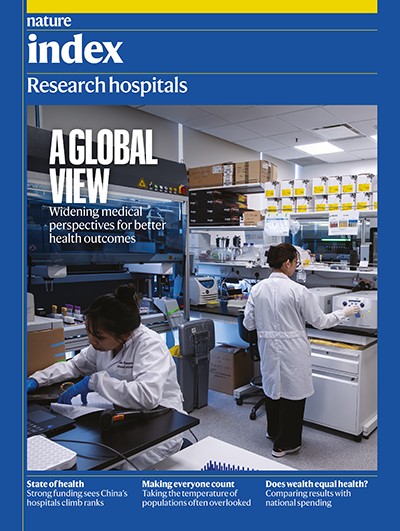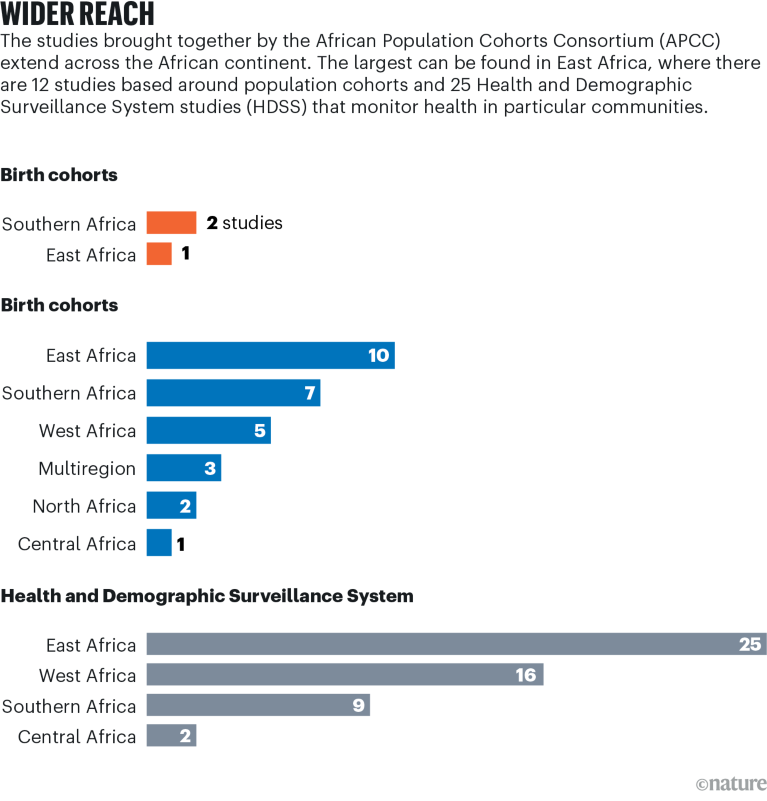A medical researcher gathers information as part of a Health and Demographic Surveillance System in northern Malawi.Credit: Malawi Epidemiology and Intervention Research Unit
In March 2020, just before borders closed and labs were shuttered by the COVID-19 pandemic, around 100 scientists gathered in Kampala to discuss forming a pan-African research consortium. Their idea: what if Africa’s many longitudinal population studies — some of which have been running for decades — could be brought together?
Although Africa is home to more than 1.5 billion people and has some of the world’s most pressing health challenges, those at the meeting felt the reach and impact of its population studies were less powerful than they could be.
That meeting marked the beginning of the African Population Cohorts Consortium (APCC), an initiative designed to connect and strengthen large-scale longitudinal studies across the continent. The 60-plus studies within the consortium, from 16 countries, have already contributed to important evidence-based health-care policies — from the first measles vaccine trials in Senegal to the roll out of malaria bed nets in The Gambia — but until now, they’ve remained largely siloed.

Nature Index 2025 Research hospitals
Many cohorts have contributed a great deal to science, but their potential is far from fully realized,” says Kobus Herbst, interim steering committee co-chair and director of population health at the Africa Health Research Institute, based in Durban, South Africa.
The consortium was supported in its early stages by charitable funders the Wellcome Trust, based in London, and the Gates Foundation, based in Seattle, Washington, as well as the UK Medical Research Council. In 2024, Wellcome awarded £4 million (US$5.37 million) to establish a permanent secretariat, hosted by the Science for Africa (SFA) Foundation in Nairobi, and to launch the consortium’s first initiatives.
“Wellcome has a long history of supporting health-data platforms such as longitudinal population studies,” says Victoria Pelly, a senior research manager at Wellcome. “Although we fund some in lower- and middle-income countries, a lot of the large-scale studies are still based in high-income countries.” Wellcome’s support for the APCC was driven “by a recognition that there’s a wealth of research capacity and context-specific data on the African continent that’s underutilized”, she adds.
The APCC’s blueprint, which sets out its goals, governance structures and priorities, was developed by a team led by Herbst and Evelyn Gitau, chief scientific officer at the SFA Foundation, and has been endorsed by the teams and institutions running the studies.
Each cohort study has a seat on a members council, which elects the steering committee. A separate participant forum makes sure that communities involved in the cohorts have a role in shaping research priorities. Delegates from each cohort meet to share views on the research planned and how it’s carried out.
Dorcas Kamuya, another co-chair of the interim steering committee, is keen to emphasize the importance of the participant forum as a way of directing the research. “We’re creating a platform informed by values we hold dear — friendship, reciprocity, togetherness,” she says. “It’s essential we don’t undermine them as we build systems.”
The APCC has already actively engaged 67 existing studies, which together represent data from around 6 million participants. Most are Health and Demographic Surveillance System (HDSS) studies — long-running observations that track births, deaths and migrations in certain communities to monitor population health over time. Others include birth cohorts that follow children from infancy, genomic studies looking at genetic and environmental risk factors, and platforms that host clinical trials in everyday settings.
Many of these studies operate in under-resourced settings. According to the World Health Organization (WHO), 64% of countries in Africa lack the capacity to accurately count and register births and deaths. Health data availability and quality remain insufficient in many countries in the region, it says. “These cohorts provide ideal environments to engage with communities, involve them in the science, and build capacity of young data scientists and epidemiologists in Africa,” says Herbst.
That’s another goal of the APCC creators: to expand opportunities for African researchers. “One of the things I hope to see is a large cohort of African scientists whose careers have been launched through this work,” Herbst says. “People who’ve done their master’s projects using cohort data, completed their PhDs within these studies, and gone on to postdocs and beyond.”
As well as a way of bringing the science together, collaborating scientists say the APCC acts as a research community, where the cohort researchers and institutions can share results with others in the field, get inspiration on questions to pursue and identify follow-up collaborations and funding opportunities. Herbst adds that the APCC can also “amplify their voices to have policy impact on the continent”, for example by pooling results or testing whether findings from one study apply in another region of Africa.
To guide those collaborations and to inform its own future funding calls, the APCC has set out three strategic research programmes: health across the life course, climate and health, and universal health coverage.

Source: Ramsey, M., Crampin, A. C., Bawah, A. A., Gitau, E. & Herbst, K. Annu. Rev. Biomed. Data Sci. 7, 277–294 (2024).
Tesfahun Melese, coordinator of the Dabat Research Centre in Gondar, Ethiopia, says being part of the APCC has opened up new opportunities for collaboration and capacity-building. The centre, based at the University of Gondar, runs three HDSS sites in the region, tracking data on indicators such as births, deaths and migration. “Being a member of the APCC, we can disseminate our research and data to the scientific community,” he says. “We can collaborate with other HDSS sites, get support for data management and analysis, co-write papers, and apply for grants together. That makes a big difference.”
Through connections made at an APCC event, Melese is setting up a partnership with another surveillance site in South Africa to do a study of youth employability, which is in the stages of securing funding from the Mastercard Foundation, a charitable Canadian funder supporting young people in Africa and Indigenous young people in Canada.